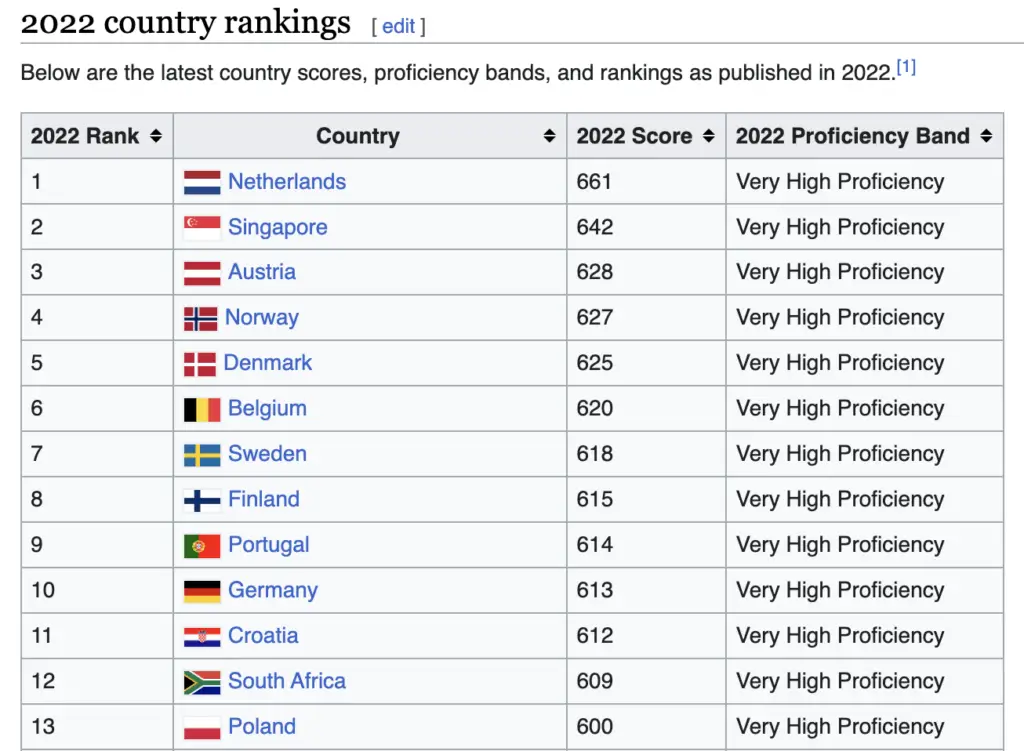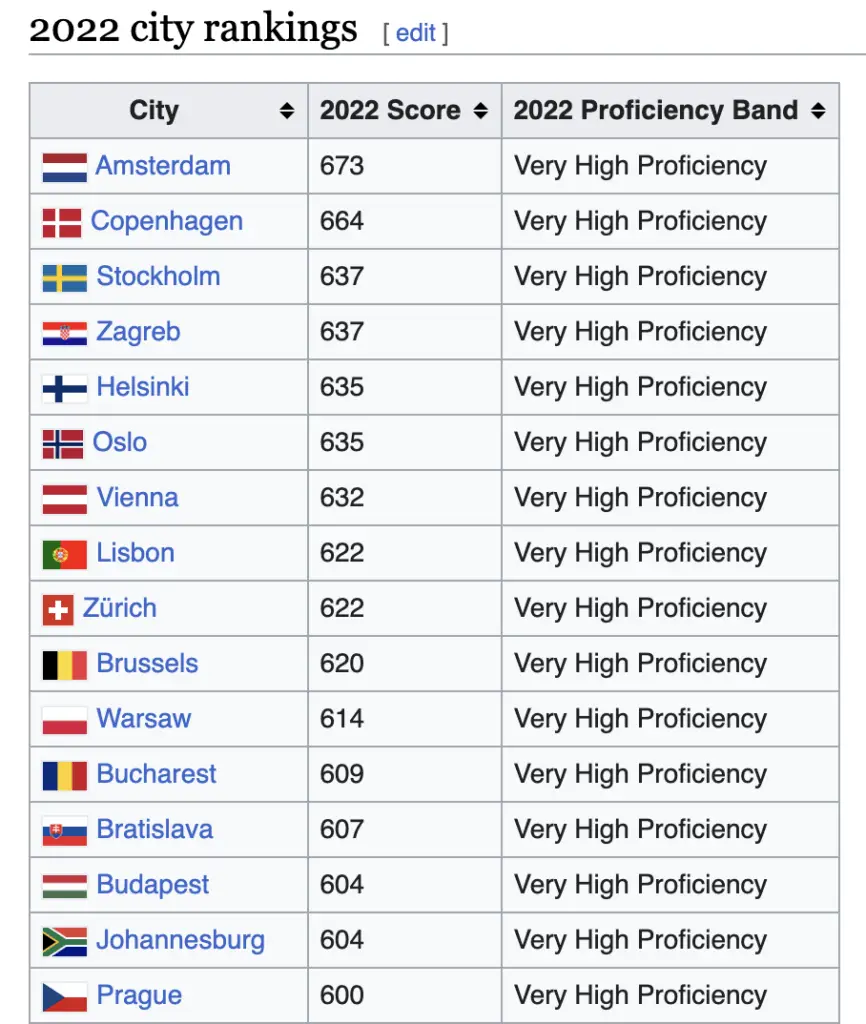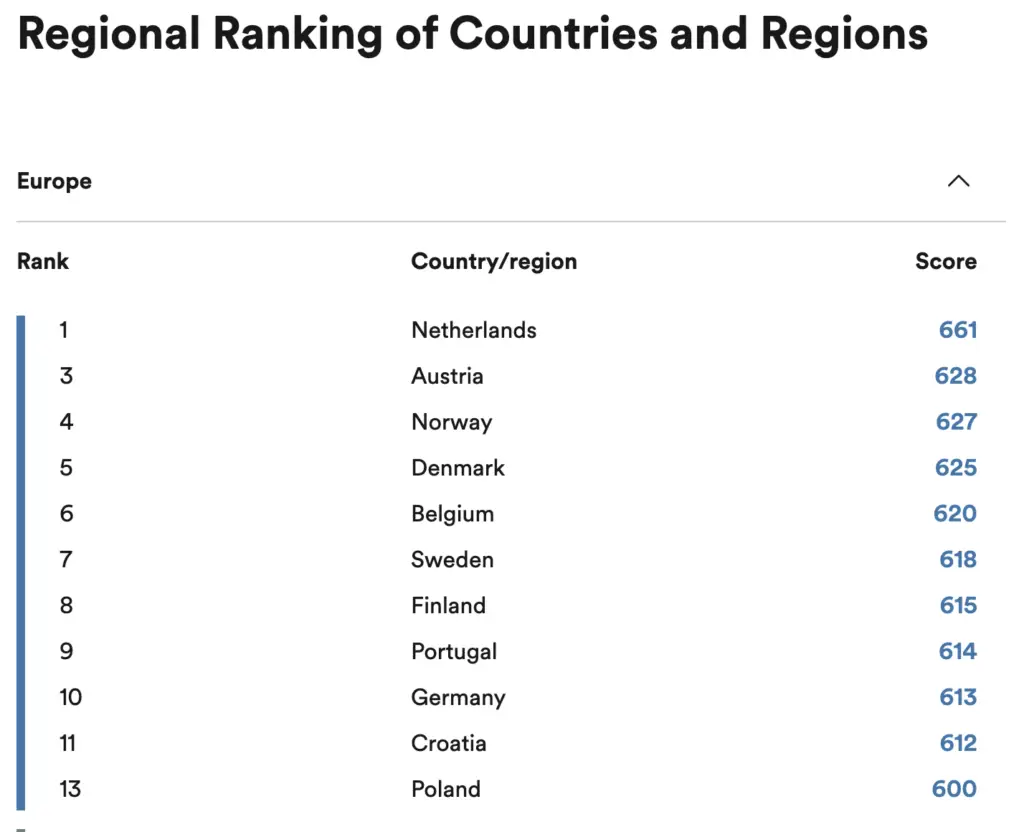The level of spoken English in Croatia is very high. In fact, nearly 70% of the locals speak some English. That’s what impressed me the most when I first moved to Zagreb. It doesn’t matter if you’re in the city’s center, taking care of bureaucracy, or in a small town in the mountains. There will be someone that speaks some English, should you need help.
And it’s not just the younger generation like most other countries. I was in Spar (a grocery store chain here) near my apartment, and an older woman asked me for help in Croatian. I apologized for only speaking English, and in perfect English, she said, “oh, my son lives in London. Where are you from?”.
That’s purely anecdotal evidence, but it got me thinking about how Croatia ranks in English proficiency among other European countries.
English First is the world’s largest English as a second language (ESL) company. I found that they do an annual English proficiency report. The index uses its standardized ESL test results to rank countries’ performance. To be included in the list, a country must have at least 400 test results. In 2022, a total of 2.1 million students took the test, making it one of the largest English proficiency data sets in the world. Let’s take a look at where Croatia falls.
So what language do they speak in Croatia?
The official language spoken in Croatia is (you guessed it) Croatian. It’s a Slavic language that uses the Latin alphabet and is the native language for roughly 95% of the population born in Croatia. It is closely related to Serbian, Bosnian, and Montenegrin languages. Some regional dialects are spoken in Croatia, which can vary in vocabulary, pronunciation, and grammar from standard Croatian.
What is the level of English in Croatia?
In 2022 Croatia scored 612, placing it as the 11th most English-proficient country in the world. I can’t say I was surprised when I saw the results showing that it ranks as one of the most English-proficient countries in the world.
It sits just behind Germany, which scored 613, and just above South Africa, which scored 609. There are only 13 countries ranked as highly proficient.

There’s also an interesting ranking by city where Zagreb ties with Stockholm as the 3rd most English-Proficient city. Its score of 637 is slightly higher than the country’s score of 612.

Now, if we’re talking just about Europe, then Croatia ranks 10th. If you’d like to see the entire list, take a look at English First’s 2022 English proficiency report. I find it quite fascinating.

My experience with English in Croatia
With all that in mind, I’ll share some more of my anecdotal experiences in dealing with local bureaucracy and generally living an English-speaking life in Croatia. I haven’t had to worry about being able to speak English with a doctor, buying groceries (even at the local markets), or navigating public transportation.
But the most surprising ‘English in Croatia’ experience was while I was completing my Digital nomad visa. When I first got to Zagreb, I needed to go to the police station to ask about my application. Having dealt with Ukraine’s bureaucracy, I was already dreading it since I don’t speak Croatian. I walked into the police station and asked in my ‘google translated Croatian’ for help verifying my address. They replied in English and helped me take care of the necessary document in English. This carried through the entire experience of getting my visa.
Another fun bureaucratic adventure that was made easy by Croatians’ excellent English was importing and registering my car. Everyone from the woman who answered the phone at the local equivalent of the DMV to the Customs officer and the insurance salesman was able to help me with flawless English. Seriously, it was probably more grammatically correct than mine.
Why is the level of English in Croatia so high?
I don’t have a conclusive answer to this. But I have a few guesses of why the level of English in Croatia is high. Most importantly, I think it’s partly because they start learning English in first grade. It’s a bit strange, though, because they also start learning English in elementary school in Ukraine. But there is a huge difference in proficiency between Croatia and there. Especially since most data, including the UN’s human development index, ranks both education systems similarly.
Another possibility may be because the primary industry in Croatia is tourism. While most people don’t work in it, it does increase the average person’s exposure to foreigners. Something that isn’t present in Ukraine. With that, there’s more opportunity to meet and practice comprehension and speaking with native or near-native speakers.
Personally, I think that the most likely reason is that Croatia is a small country of around 4 million people. If they want to be successful in business, or their career, they must learn another language. In my experience, the IT industry here almost exclusively works in the English language.
Thinking about moving to Croatia?
Whether you’ve been to Croatia before or not, there are some things you should know before you move. In this post, I cover 18 things you should know about living Croatia before you move.

